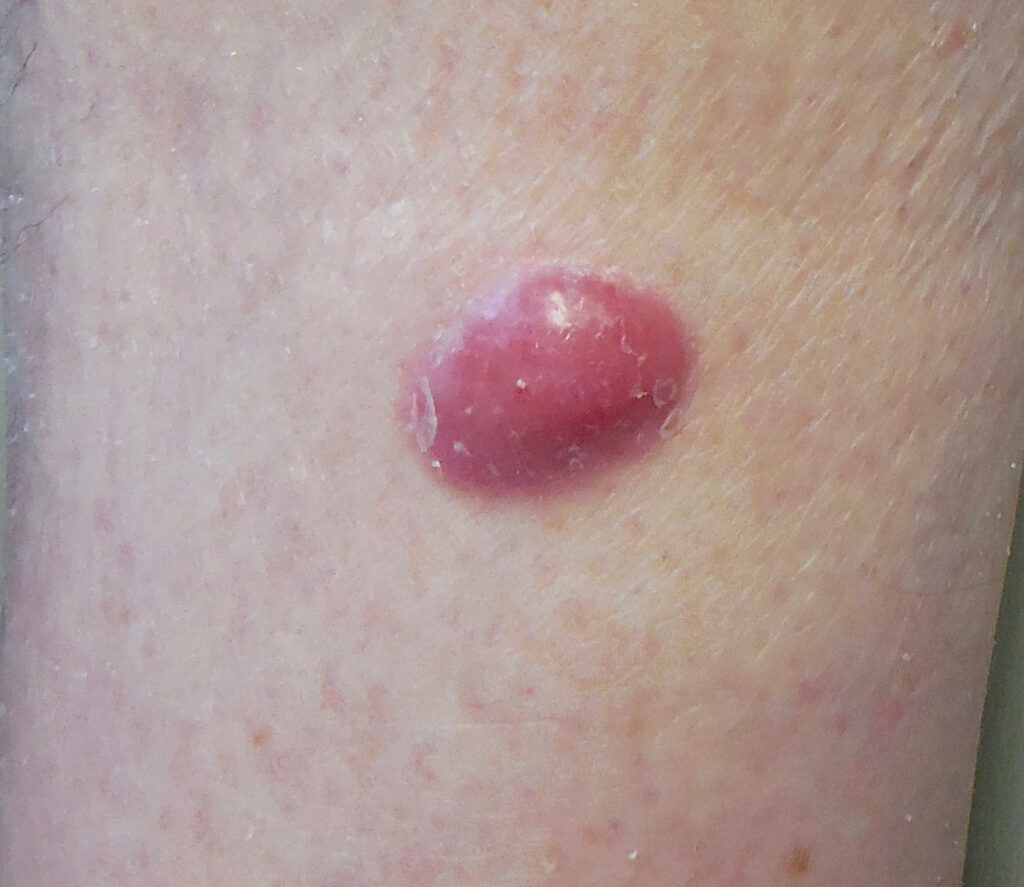Merkel Cell Carcinoma (MCC) is a rare but aggressive type of skin cancer that originates from Merkel cells, which are found in the epidermis and contribute to touch sensation. This carcinoma is highly malignant and tends to spread rapidly to lymph nodes and distant organs. MCC is primarily linked to the Merkel Cell Polyomavirus (MCV) and excessive ultraviolet (UV) radiation exposure.

Causes and Risk Factors
Several factors contribute to the development of Merkel Cell Carcinoma:
- Merkel Cell Polyomavirus (MCV): This virus is detected in approximately 80% of MCC cases and is believed to play a significant role in cancer development.
- Ultraviolet (UV) Radiation Exposure: Chronic sun exposure, particularly in fair-skinned individuals, increases the risk of MCC.
- Weakened Immune System: Patients with compromised immunity due to conditions like HIV/AIDS, organ transplantation, or immunosuppressive therapies have a higher risk.
- Advanced Age: Most MCC cases occur in individuals over 50 years old.
- Fair Skin: Lighter skin tones are more susceptible due to reduced melanin protection against UV radiation.
Symptoms of Merkel Cell Carcinoma
MCC often appears as a painless, firm, and rapidly growing nodule on sun-exposed areas such as the face, neck, or arms. Common characteristics include:
- A shiny, dome-shaped lesion with a bluish-red or purplish tint.
- Rapid growth and ulceration.
- Swelling of nearby lymph nodes.
- The lesion may resemble other skin cancers, making early diagnosis crucial.
Diagnosis of Merkel Cell Carcinoma
Early detection and diagnosis are critical for effective treatment. Diagnostic methods include:
- Skin Biopsy: A tissue sample is examined under a microscope to confirm malignancy.
- Immunohistochemistry (IHC) Tests: Staining for markers such as CK20 helps distinguish MCC from other skin cancers.
- Imaging Tests: MRI, CT scans, and PET scans determine the spread to lymph nodes or distant organs.
- Sentinel Lymph Node Biopsy (SLNB): This helps assess metastasis to nearby lymph nodes.
Treatment Options for Merkel Cell Carcinoma
Treatment depends on the stage of MCC and may include:
1. Surgery
- Wide Local Excision (WLE): Removes the primary tumor along with surrounding healthy tissue.
- Lymph Node Dissection: In cases where MCC has spread to lymph nodes.
2. Radiation Therapy
- Used post-surgery to destroy residual cancer cells.
- Recommended for inoperable tumors or high-risk cases.
3. Chemotherapy
- Administered for advanced MCC cases with distant metastases.
- Common agents include etoposide, carboplatin, and cisplatin.
4. Immunotherapy
- Checkpoint inhibitors such as Avelumab (Bavencio) and Pembrolizumab (Keytruda) boost the immune system to target cancer cells.
- A preferred option for metastatic MCC due to its promising survival rates.
5. Targeted Therapy
- Involves drugs targeting specific genetic mutations present in MCC cells.
Prognosis and Survival Rates
The prognosis depends on the stage at diagnosis:
- Localized MCC: 5-year survival rate of approximately 60-70%.
- Lymph Node Involvement: 5-year survival drops to 40-50%.
- Distant Metastases: 5-year survival rate is below 20%.
Prevention and Risk Reduction
Although MCC cannot always be prevented, the following measures may lower the risk:
- Minimizing UV Exposure: Regular use of broad-spectrum sunscreen and protective clothing.
- Routine Skin Examinations: Early detection improves treatment outcomes.
- Immune System Maintenance: A healthy lifestyle and proper medical care help reduce risks.
Merkel Cell Carcinoma is an aggressive skin cancer requiring early detection and prompt treatment. Advances in immunotherapy have significantly improved outcomes for metastatic cases. Awareness, preventive measures, and routine skin checks remain crucial in managing MCC effectively.

